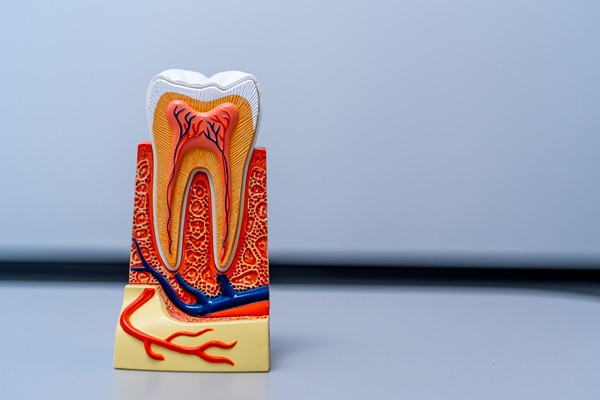What Is Root Canal Surgery (Apicoectomy)?

Root canal surgery, otherwise referred to as an apicoectomy, is performed by a dentist, endodontist or oral surgeon after the pulp located inside of a tooth’s root becomes infected. Infected tooth pulp can be a serious concern that causes pain and sensitivity in the patient and can worsen if left untreated.
Root canal surgery
By fully understanding what root canal surgery is and who may be in need of a root canal surgery, you can determine whether the procedure is a possible option for you.
The following is everything to know about root canal surgery, including what it is, who needs it and how the process of root canal surgery works.
What is root canal surgery?
Root canal surgery is a surgical operation performed on patients who suffer from infected tooth pulp. Tooth pulp is the most vital part of the tooth and consists of living blood vessels and important nerves and connective tissue. When the root of a tooth gets infected, the chance of tooth loss is much higher, especially if the infection is left untreated for an extended period of time.
Root canal surgery is a fairly simple procedure for most dentists and oral surgeons, although it is a surgical procedure that requires the use of anesthesia to minimize the amount of pain the patient experiences.
Who needs root canal surgery?
Those who have an infection deep inside the root of their tooth may be a good candidate for root canal surgery. However, there are times when pain in the tooth’s root may exist without an infection being present. Here are a few other times when a root canal surgery may be in order:
- Deep tooth decay
- Cracked or chipped teeth
- Loose teeth
Anyone who suffers from sensitivity or pain in the deeper parts of one or more teeth should visit their dentist and discuss all possibilities for treatment, including root canal surgery.
How does root canal surgery work?
Although it is surgery, root canal surgery is a fairly simple process that can be broken down into a few simple steps.
Here is the usual process involved with root canal surgery:
- Dental X-rays and oral examination
- Local anesthetic and numbing
- Access and removal of infected pulp
- Tooth filling is placed
- Tooth restoration is placed
On your first visit for root canal surgery, the dentist will confirm the diagnosis through an oral examination and dental X-rays. After both the patient and the dentist agree to a root canal surgery, a time is scheduled for the operation.
The root canal surgery is completed within several hours, and the patient is able to go home the same day with a healthy tooth free from infection.
Root canal surgery aftercare
The process of root canal surgery does not end after the surgery, however, and aftercare is needed to ensure a full, quick recovery.
Your dentist, endodontist or oral surgeon should walk you through the entire aftercare process, answering any questions or concerns you have along the way. Be sure to avoid harmful foods that raise the risk of infection, and practice good oral hygiene, along with other recommendations from your doctor.
Are you considering root canal surgery in the Santa Rosa area? Get more root canal surgery information at https://santarosaendodontics.com.
Check out what others are saying about our dental services on Yelp: Root Canal Treatment.
Recent Posts
A non-surgical root canal is an endodontic procedure known for preserving a tooth affected by severe decay, infection, or trauma, all without incisions in the gum tissue. Many patients become anxious when they hear the term "root canal," yet modern techniques can provide a gentler experience than expected. Endodontists often recommend this treatment when a…
A general dentist can perform basic tasks in tooth care, such as X-rays, oral examinations, filling cavities, and extractions. However, patients may be referred to an endodontist for more complex work, such as certain root canals. When is it likely for a dentist to refer a patient to this dental specialist?While a filling can fix…
Root canal treatment is often the first line of defense for treating teeth with compromised pulp chambers. The pulp chamber is the innermost layer of a tooth, and it stores nerves, blood vessels, and connective tissues. The chamber is sealed off from the rest of the tooth to protect it against bacteria and other irritants…
A root canal can preserve and strengthen a severely damaged or infected tooth. When seeing a root canal dentist, asking informed questions can provide clarity, ease concerns, and improve treatment outcomes. Understanding the procedure helps make the experience more comfortable and ensures you are well-prepared for each step.While each patient's situation is unique, the following…


